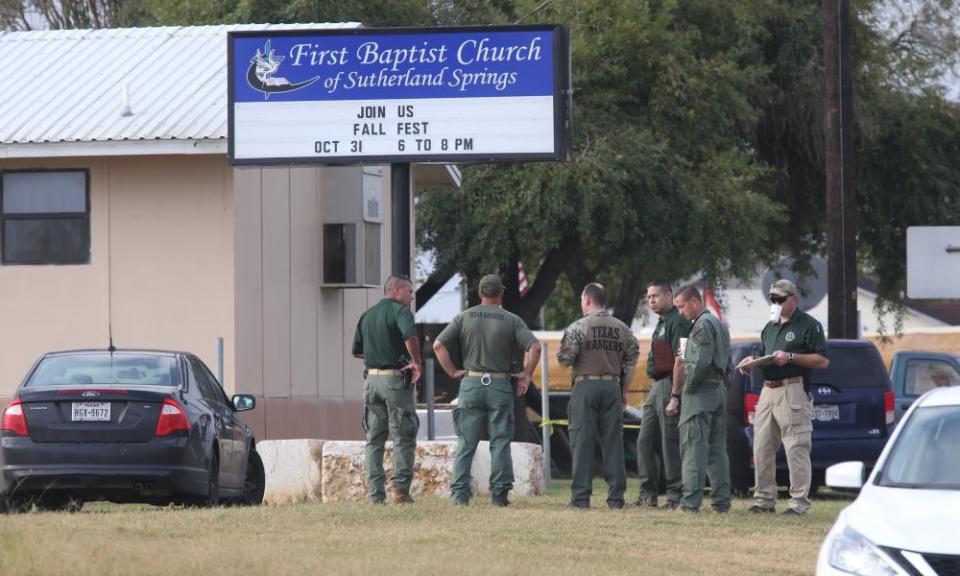US military consistently fails to report domestic violence to gun database, senators say
Jeff Flake condemns ‘egregious oversight’ after Texas shooting suspect was able to buy gun despite domestic assault conviction

Two senators said on Tuesday that the US military had a widespread problem that went far beyond the failure to report the Texas church shooting suspect’s domestic violence records to the nation’s background check system for gun sales.
Domestic abusers are prohibited from owning guns under federal law, but Senator Jeff Flake, an Arizona Republican, said at a news conference on Tuesday evening that a systemic failure had allowed the alleged Texas church shooter to purchase guns despite domestic violence convictions he received while in the air force.
“This egregious oversight has allowed individuals such as the Texas shooter, who otherwise should not have been able to legally purchase a firearm, to do so,” Flake said.
The air force said in a statement on Monday night that Devin Kelley, the alleged Sutherland Springs gunman, should have been legally prohibited from buying or owning firearms. But the Holloman air force base office of special investigations had failed to enter the record of Kelley’s conviction for domestic abuse into the national background check system, according to “initial information”.
The air force and defense department said on Monday that they had launched investigations into this failure, as well as whether other criminal records had been properly reported.
A 2015 report from the defense department’s inspector general found the navy, air force and marine corps had made many errors in reporting criminal record conviction records to the FBI. The report found that 30% of the records that should have been reported were missing.
Spokespeople for the air force, the defense department, and the FBI were not able to clarify on Tuesday whether and to what extent military domestic violence records were being submitted to the background check system.
At the press conference, Flake said there had been only a single domestic violence record submitted from the armed services to the background checks system since 2007.
“Unless we’re to assume there’s been only been one case of domestic violence in the military over that point of time, we have a problem. We have a loophole here that needs to be closed,” said Flake, who, with Senator Martin Heinrich, a Democrat, announced they were co-sponsoring legislation to close the loophole.
But Flake referenced a chart from a 2016 FBI report, which cautions that the chart only refers to a subset of records within the entire background check system, and that some records might be submitted through other databases.
Flake and Heinrich’s offices did not immediately respond to requests to clarification on whether the chart had been misinterpreted.
“I don’t know if [the chart] paints a full and accurate picture of the Department of Defense total reporting on these issues,” Thomas Crosson, a defense department spokesperson, told the Guardian before Flake’s press conference.
In response to Flake’s press conference, some experts questioned whether new legislation was needed. The military is already required to report domestic violence records to the background checks system under federal law, and under a previous instruction from the Department of Defense, said Geoffrey Corn, a military law expert at the South Texas College of Law.
“I’m not sure the answer here is another statute,” he said. “I don’t think this is a case of malice. I think it’s just a case of too many cooks in the kitchen and nobody knows who’s doing what.”
After high-profile mass shootings in the past decade, the National Instant Criminal Background Check System (Nics) has repeatedly come under scrutiny for faulty reporting, missing records and bad procedures, including after the 2007 Virginia Tech shooting and the 2015 white supremacist attack on a historic black church in Charleston, South Carolina. Advocates have led campaigns to correct failures to report the appropriate state mental health records to the background check system.
In 2012, the Texas gunman Devin Kelley, an airman at the Holloman air force base in New Mexico, was convicted by a court martial on two charges of domestic assault and sentenced to a year of confinement. He left the air force in 2014 with a bad conduct discharge.
Law enforcement officials said Kelley went on to buy at least four guns, two in Colorado and two in Texas, in 2014, 2015, 2016 and 2017. On Sunday, officials said, Kelley opened fire on a tiny church during morning services, killing 26 people, many of them children.

